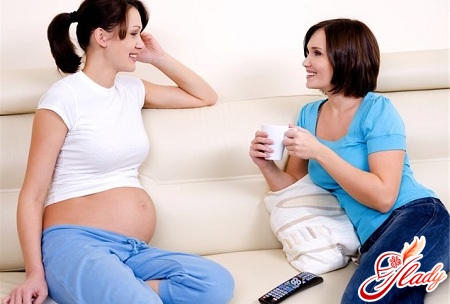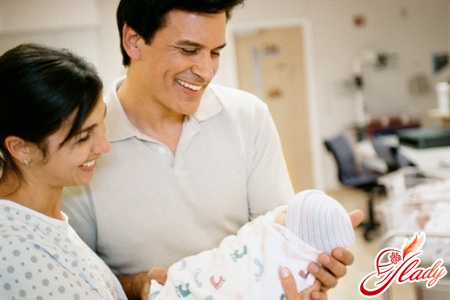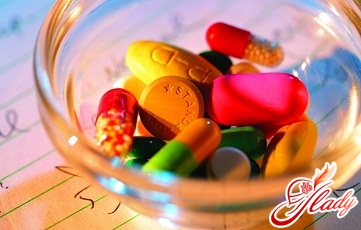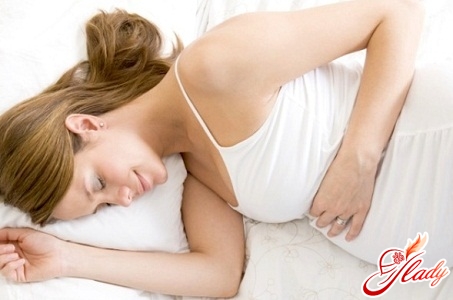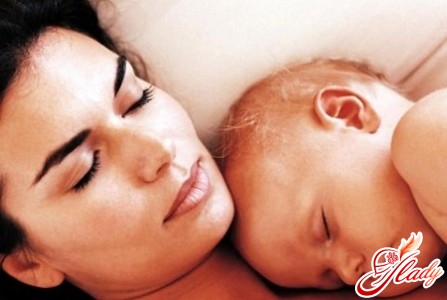 Long months of waiting to be born and notthe most pleasant moments of the birth process were left behind. Mom and the baby finally saw each other. However, not always, unfortunately, very many young mothers do not have to relax - the complications after childbirth are very common. And this is not surprising - because during pregnancy in the body of a woman there are many very different changes - the hormonal background, the position of internal organs, changed as a result of intrauterine growth of the child. In order for all these changes to disappear and the work of all organs and systems recovered in the previous regime, at least one and a half to two months is needed. And at this stage women often face complications after childbirth. Where do they come from? To understand this, you need to know exactly what processes occur during this period in the body of a young mother. First, let's see what complications are considered postpartum. The involution of organs and systems that have changed during pregnancy and delivery lasts approximately six to eight weeks - this is the period that gynecologists and doctors call the postpartum period. And accordingly, the complications after childbirth are exactly those that arise in a given period of time. Normally, all organs and systems, with the exception of the mammary glands and hormonal background, which are responsible for breastfeeding, during this time should be fully restored.
Long months of waiting to be born and notthe most pleasant moments of the birth process were left behind. Mom and the baby finally saw each other. However, not always, unfortunately, very many young mothers do not have to relax - the complications after childbirth are very common. And this is not surprising - because during pregnancy in the body of a woman there are many very different changes - the hormonal background, the position of internal organs, changed as a result of intrauterine growth of the child. In order for all these changes to disappear and the work of all organs and systems recovered in the previous regime, at least one and a half to two months is needed. And at this stage women often face complications after childbirth. Where do they come from? To understand this, you need to know exactly what processes occur during this period in the body of a young mother. First, let's see what complications are considered postpartum. The involution of organs and systems that have changed during pregnancy and delivery lasts approximately six to eight weeks - this is the period that gynecologists and doctors call the postpartum period. And accordingly, the complications after childbirth are exactly those that arise in a given period of time. Normally, all organs and systems, with the exception of the mammary glands and hormonal background, which are responsible for breastfeeding, during this time should be fully restored.
The condition of the uterus after childbirth
Immediately after the child is born andthe uterus separates, the uterus begins to shrink very intensely and acquires the shape of a ball. The uterus shrinks in fact very quickly - on the first day after the birth of the baby it weighs about a kilogram, on the seventh day it is already 500 grams, and only four six weeks its original size and all (50 grams) is completely restored. The whole process of recovery of the uterus is sometimes very impressive for a woman: pain in the lower abdomen. Particularly intense pain awaits the young mother in the first few days, repeatedly intensifying during feeding. This fact is explained by the fact that during the breastfeeding of a baby the woman begins to actively develop a hormone oxytocin. It is this hormone that stimulates the contraction of the uterus, so it is at the moment of feeding the child that the painful sensations are the most intense. But the cervix of the uterus acquires its original form in much longer terms - about 13 - 15 weeks after the birth of the child. But no matter how easy the childbirth was, and no matter how small a child was born, it will not completely recover, unless, of course, the woman was given a cesarean section. These changes in no way affect the state of health of women. In some cases, with a deficiency of the hormone oxytocin and excessive overstretching of the uterus (in the event that the child has a large weight), the uterus contraction does not properly occur. And accordingly, and the uterine cavity is cleared in an insufficient way. And this means that a woman at times increases the risk of developing postpartum acute endometritis. With this disease the mucous membrane of the uterus becomes inflamed. The woman raises her temperature, sometimes to very high figures, there are very strong pain in the lower abdomen and lower back, weakness, there may be abundant vaginal discharge with a very unpleasant odor.
Injuries to external genital organs
Very often women soon after childbirth applyto the doctor - a gynecologist with complaints of severe pain in the vagina. During the conversation with the patient, as a rule, the doctor - gynecologist finds out that the painful sensations appeared soon after the sexual intercourse. And it's not at all surprising - because the vagina in the process of childbirth is also strongly deformed - it stretches. And it is restored only to 6 - 8 week after childbirth. And approximately by this time the mucous membrane of the vagina is completely restored. After all, even if the childbirths flowed easily, without breaks, the mucous membrane of the vagina is still injured. And to ensure that the microcracks on the mucosa completely healed, it takes some time. Not to mention those situations where there were gaps or sections of the perineum - the time for regeneration will take even more time. And in the event that a married couple does not survive the recommended terms of the doctors, during the sexual act is very high risk of re-injury to the mucous penis. And sometimes these injuries are so serious that doctors have to re-sew micro-trauma. In addition, during sexual intercourse with unhealed microtraumas of the mucous membranes of the vagina during sexual intercourse, the risk of introducing pathogenic microflora into them is very high. And, as a consequence, the inflammatory process will inevitably begin, which also causes both acute pain sensations, a significant increase in body temperature, and a deterioration in the general condition of the body. If a woman who has recently given birth to a child will notice such symptoms, she should immediately seek help from a gynecologist. To tighten in a similar situation in no event it is impossible, as complications can be serious enough. 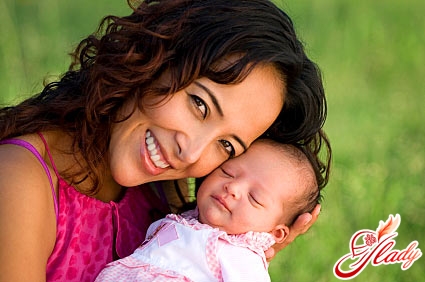
Complications from the cardiovascular system
In addition, childbirth after 40 years of complication is not uncommongive from the side of the cardiovascular system. After all, during pregnancy and it undergoes significant changes - the volume of circulating blood increases significantly. And after the crumb is born, this volume gradually begins to decline, reaching the same volume in about a week. Naturally, these changes can not pass without a trace for blood vessels and heart. In the event that a woman has any problems with the cardiovascular system, in the postpartum period complications can begin. A woman can begin to complain of pain in the heart, heartbeats begin to increase. In addition, in the first 14 - 16 days after the birth of a child in the blood, a woman has a very large number of platelets. They increase due to the fact that the clotting system begins to work actively about a day before the birth, as the body begins to prepare for the bleeding that is necessarily present during any delivery. This is a natural process designed to protect a woman from heavy blood loss. However, this medal also has two sides - because of the high content of platelets, the woman has a very high risk of developing blood clots that threaten to clog the blood vessels. That's why doctors recommend being extremely attentive to their health - because thromboembolism is a very dangerous disease.
Complications from the bladder
Very often after giving birth a woman experiencescertain problems from the bladder. As a rule, after giving birth, the tone of the smooth muscles of the bladder is significantly reduced, as a result of which the woman completely loses the feeling of urge to urinate. And the more difficult and longer the delivery, the more the problem becomes worse. That is why, in the first few days after childbirth, a young mother is simply obligated to visit the toilet approximately every two hours, regardless of whether she feels the urge to urinate or not. If the bladder is not emptied in time, it naturally overflows. And the overflowing bladder very much hinders the uterus from fully contracting and removing postpartum discharge from it. As a consequence of this phenomenon, the risk of developing inflammatory processes, including postpartum endometritis, is very high. If a woman feels a sharp pain in the abdomen and lower back, an increase in body temperature, weakness, she should as soon as possible turn to a doctor - a gynecologist.
Problems from the gastrointestinal tract
In addition to decreasing muscle tonethe bladder, it also decreases in the gastrointestinal tract. As a result - a woman starts constipation, sometimes quite strong. This problem affects two thirds of all newly mummified. And with these constipations not only it is possible, but also it is necessary to struggle actively. Doctors recommend for this two methods of exposure:
- Physical impact. The simplest, but at the same time, effective way to make the intestines work is a stream of warm shower directed towards the lower abdomen. The head of the soul stimulates the receptors and enhances the intestinal peristalsis. In addition, you can use a stomach massage - stroke the stomach in a circular motion, clockwise, for 10 minutes, at least three times a day.
- The right diet. No less important and the correct diet - eat more zucchini, prunes, pumpkins and green apples. Do not be afraid for the digestive system - these foods will not bring him absolutely no harm, and the appearance of diarrhea also can not be feared. Sometimes a young mother prefers to follow the path of least resistance and uses laxatives. However, doctors do not recommend abusing pharmacological drugs for longer than the first five days after the birth of the child.
There is another problem directly related to thewith pregnancy and constipation - varicose veins of the rectum, or, more simply - hemorrhoids. Approximately 75% of all women who gave birth to a child, to some extent, but still marked hemorrhoids. However, the degree of expression of this phenomenon can be very different. In the easiest cases, the hemorrhoidal nodes are very small, and they disappear by the end of the first week, without causing any discomfort to the woman, and not requiring medical intervention. However, unfortunately, this is not always the case - sometimes the pain from hemorrhoids is much stronger than the pain from tears and perineal incisions. In this case, a woman should not under any circumstances suffer severe pain, or try to get rid of it on her own. It is much more reasonable to seek help from a doctor who will help you choose the optimal treatment regimen that will not harm your mother or baby, but at the same time will very quickly alleviate the condition.
When should I see a doctor?
So, let's sum up all the above - whendoes the young mother need to see a doctor? After all, the problem of "I'm afraid of complications after childbirth" certainly costs almost every woman who recently gave birth to a child. In order to avoid these complications, you need to be as attentive to your health as possible - only a timely call to a doctor - a gynecologist can reduce complications to a minimum.
- Pain in the abdomen. Despite the fact that pain in the postpartum period, in principle, are normal and typical. However, these painful sensations are rather tolerable. But in the event that the pain becomes too intense, the young mother should be worried, especially if the pain is given back. The doctor will prescribe an ultrasound for a woman, which will allow to identify inflammatory processes, and also prescribe an optimal treatment regimen.
- Condition of seams. In the event that a woman has stitches - and it does not matter, from cesarean section, or from incisions and ruptures of sutures, their condition must be treated with special attention. In the event that the stitches begin to blush, to heal, or the patch will appear on the bandage, you need to see a doctor as soon as possible who will really appreciate the condition and, if necessary, take the necessary measures.
- Excretions from the genitals. In the event that the young mother suddenly changes the nature of vaginal discharge - they can become more abundant, change the consistency, color and smell, she should as soon as possible seek help from a gynecologist. In no case do not expect that everything will go by itself - sometimes indeed changes in the discharge are not cause for concern.
And sometimes such changes cantestify to the development of certain postpartum complications, for example, the inflammatory process or vaginal dysbiosis. And unequivocally and precisely to establish, that entailed these changes, the doctor - the gynecologist can only. And do not forget that even if the young mother does not worry at all, a month after the birth, she must visit a doctor - a gynecologist, who will conduct a preventive examination. On this examination, the doctor will determine whether the recovery of the young mother's organism is normal, whether she is not threatened with complications after childbirth. We advise you to read:




